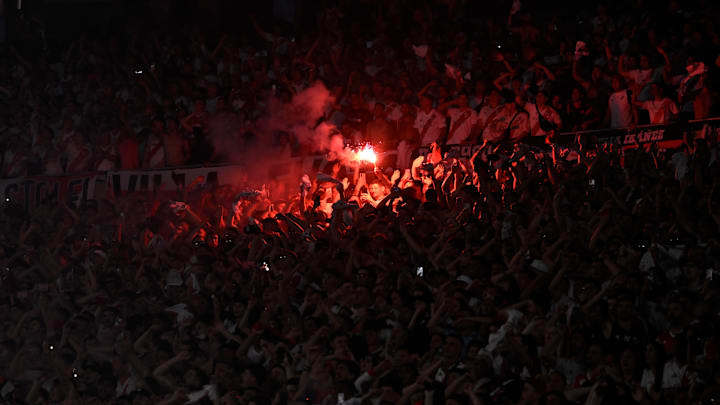River Plate's supporters certainly know their celebrations. Their Sunday night spectacle in the Monumental de Nuñez, during the most recent match of Libertadores, did not come so cheaply, however. Besides being defeated by Atlético-MG, River now faces an unexpected problem: the temporary closure of the Monumental ordered by the Municipal Police and by Government Control Agency. The reason? Bright fireworks lit the stands right before the kickoff, a translation of skillfulness. But Conmebol has its rules, and pyrotechnics aren't part of them.
Follow Playing for 90 on X (Twitter).
When the players took the field, it was a spectacle of colors and fireworks-the public put up one of the most striking images of Libertadores. That same celebration, however, came with a consequence: a fine and the closure of the stadium until such time as River Plate pays the debt. If the inspection that found the fireworks came right after the game, an even more surprising detail is that they were found in a stadium bathroom. Not exactly subtle.
Temporary Closure for Monumental: Consequences and Expectations for the Final
With Monumental shut down by the police, the big question is how that will affect the highly expected Libertadores final. For its part, Conmebol has made it very clear: the final will be at Monumental, regardless of River Plate's setbacks. After all, with over 80,000 fans, Monumental is Argentina's largest stadium-the ideal venue for an electrifying final.
Despite the gossip of an all-Brazilian final, which set tongues wagging over the prospect of Conmebol opting for the small Independiente's stadium with its 42,000 capacity, they continued to insist: the final is at Monumental. It now turns the tables on River Plate to meet the demands in time to stage the match at the home of River Plate.
Atlético-MG and the First Finalist: A Game That Shaped Outcomes
The first Libertadores finalist was decided at Monumental de Nuñez. The score was not at all a surprise because Atlético-MG had been capable of holding River Plate in a goalless tie, which allowed them to go to the final thanks to their 3-0 victory in the first leg. The night had a bittersweet tone for the Argentine fans while they saw their team get eliminated at home, and then were informed about the fine and the temporary stadium closure: a double whammy.
The Celebration of the Fans: An Expensive Show
The River Plate fans are surely fervent, and the scenes of the title celebration at the Monumental show proof. The also spectacular use of fireworks and flares comes with a financial cost and an aftermath that is far from harmless. Conmebol is unequivocal: pyrotechnics are forbidden. River Plate, far from being unfamiliar with the controller, pays the bill. What happened with the celebration of the fans now becomes an administrative problem, financial as well.
This incident also brings up a question that bothers a great number of fans: up to what point is it possible to penalize with such rigor the spectacle of the stands? These expressions are symbolic of South American soccer culture, but Conmebol does not take care of that and insists on applying its rules. For River Plate, the cost of this exuberance goes beyond feelings and reaches the club's finances.
What to Expect from the Final at Monumental
With Conmebol, the Monumental continues to be the least bad option for hosting the final. Its central position in Buenos Aires, in addition to its capacity, makes it very attractive for such a big event. Considering that an all-Brazilian final is drawing near, according to some, it would be best if a stadium like the Monumental hosted such a final. Others prefer it to be on Brazilian ground, such as Morumbi. However, Conmebol's leadership does not want to risk anything, and everything points to the fact that River Plate will meet all the conditions in due time and will solve the problem with the Argentine authorities.
Besides, having Monumental means something more important: the stadium is a symbol, first of all, of Argentine soccer but also of Libertadores tradition.
